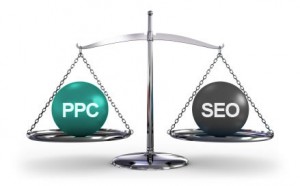What Should I Invest In First: SEO or Paid Search (PPC)?
Traditionally, we at Que Commerce have professed that investing in paid search is a great way to kick start your digital marketing efforts (pending you’ve invested in the proper assets including an effective responsive website as well as a business that really does solve a problem).
Lately, we have noticed instances where going straight into search engine optimization proves a more effective strategy. As SEO companies deal with Google now fully encrypting all search keywords for organic searches, understanding when it’s best to invest in either can be ever more important than today. Here we outline reasons to invest in SEO versus Paid Search (PPC).
Reasons To Invest In SEO First
Cashflow is Not An Immediate Driver
Most small businesses have not hired a technical SEO company to serve as an extension of their marketing department. And to that extent most small businesses rely on cashflow to reinvest and grow their businesses. Given that SEO is a long-term strategy that yields ongoing and increased traffic, small businesses may not reap the ROI they are seeking in the first 2 months of launching an SEO campaign. However, SEO for the long term does produce much higher ROI impact than Paid Search.
Your Firm’s Average Customer Value Is Fairly Low
For illustration, we’ve had a number of authors who approach us requesting that we perform search engine optimization to help their books ranks higher in the search engines. These are individual brands with limited budgets, so near term sales don’t entirely drive future strategy or reinvestments. The sale of the books won’t impact the same decisions that publishing companies may have. However, due to the cost of SEO ($1,500 – $10,000’s per month), investing in SEO becomes a pricy proposition for people and companies that offer a low average customer value product or service unless:
- There is an expected repeat number of sales
- The expected referral value is high
- Digital competitive nature of the industry and keywords we’re attempting to rank for is low to medium
Keep in mind SEO has to extend beyond direct sales. It has to include branding as part of the mindset for shoppers. If your average customer value is low and you’re focused on more of a long-term strategy, SEO could be a better source of growth for you.
Branding versus direct response marketing is our goal
Companies with a branding agenda are more critical than capturing immediate sales. Take for example the new product that was just launched yesterday that had no traditional branding campaign (TV, Radio, Print) as well as no distribution partnerships. The product is only being sold online at this time. If direct response is the goal, search engine optimization will prove a disappointing strategy because getting quick sales feeds the beast much quicker. However, if these same companies place about 75 – 80% of their effort on branding through the use of SEO with the hope that 25 – 30% will translate into more sales, the business objectives will be further in line with where the product is based on brand awareness.
Reasons To Invest In Paid Search First
Immediate Sales Will Make All The Difference For Us
If you want to captures sales and attract eyeballs to your brand, focus on paid search. When you have 4 billion searches occurring online each and everyday, a large share of companies that leverage paid search (pay per click advertising) are getting a huge shot in the arm. This approach is predicated on the average customer value, cashflow implications, and the competitiveness of the industry in which you are advertising via certain keywords. All of these factors can impact the decision to leverage paid search.
You Are Testing Product/Service Offerings
This is a not a perfect system, but leveraging paid search to test out products and services can be effective to get initial data along with future protected costs to the advertiser. These tests don’t have to cost the company a lot of money and can drive sales and interested buyers to the brand. We also leverage this approach to test out a website and how certain keywords line up with the user experience and content on the website.
Reasons To Invest In Both Simultaneously
Prefer To leverage Paid Search Data To Drive SEO Strategy
With the recent “Not Provided” change within Google where close to 100% of keywords will not be shared through organic searches (many SEO’s are shocked but were expecting this), leveraging paid search will become even more important to discern bounce rates and User Experience for specific keywords. Many times, we’ll leverage paid search data to drive which keywords are producing the proper conversions for our clients. The traffic is immediate, the data is incredibly measurable, and nimble SEO teams can make ongoing enhancements to SEO campaigns through the use of paid search data.
Implementing an Integrated Digital Strategy
If you have a decent size budget in which you’re allocating to some reasonable offline marketing channels including sponsorships, events, print, and direct mail, allocating a portion of the marketing budget to both paid search and SEO can prove even more advantageous because inbound marketing typically costs less than outbound marketing channels and that marketing mix can be even more powerful if your SEO team is leveraging offline marketing into the digital realm. One tip for companies who choose this approach is to leverage recent sponsorships to attain backlinks pointing back to your website. If you are also implementing a paid search campaign from potential searchers in the market, you can even further leverage those sponsorships and further ensure they are landing on your website.
There are a hosts of reasons to leverage SEO versus PPC, but overall if you are a company looking to increase your brand awareness and direct sales, understand both sides of the ledger can be critical to the success of your online marketing efforts.

Leave a Reply